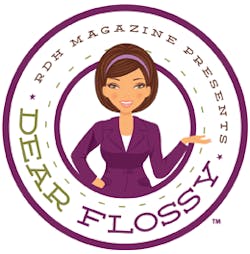Dental hygiene career alternatives: Is forensic dentistry a viable career field?
Dear Flossy,
I have been an RDH for 12 years and have worked at the same office for my 12 years. I have an Associate degree only. I was thinking about forensic dentistry and was wondering if I need a Bachelor degree for that, and if not, how do I pursue a career change? Any thoughts would be appreciated.
—Considering Forensics
It is always good to learn of dental hygienists having an interest in forensic dentistry. I encourage and support this interest, however, this is definitely not a career or a career change. Dental hygiene is our profession and involvement in forensic dentistry is an enhancement of it. It is an opportunity to assist in legal matters by applying our knowledge and experience in several areas. This could be in advocacy and prevention of abuse, anthropology, age estimation, pattern marks and injury analysis, expert testimony, and certainly human identification.
What forensic dentistry is not is a 9 to 5 job. It does not pay the bills. Most of those involved do so on a volunteer basis or hold a contract with a jurisdiction. These contracts are usually held by forensic dentists.
If a dental hygienist wants to pursue involvement in forensics, additional degrees are not necessary. We have the basic education needed to participate. Today the interest is much higher than 15 years ago and a bit harder for hygienists because so many more dentists are involved. For this reason, I encourage additional education. One may want to take seminars on all the areas of forensic dentistry.
I encourage all to find a local dental forensic society and become a member. The dentists there may allow you to work with them on cases and learn as a mentee. Much can be learned from these study clubs. Some constitute a medical examiner's identification team and that is a way to be an active participant. There is also a national society that welcomes dental hygienists and meets once a year for day long courses.
I also suggest that hygienists look into the US government teams called Disaster Mortuary Operational Response Teams (DMORTs). There are many dental hygienists across the country who have been qualified to serve on these teams. They provide formal training and they are activated and respond whenever a multiple fatality incident occurs. This can be anywhere in the United States or other countries who seek US help.
Their application, found on their website, is extensive and there may be a waiting list, but it is an excellent way to get into the forensic dentistry arena. (1)
Good luck to all in this endeavor.
For the most current dental content, click here.
Winnie Furnari, RDH, MS, FAADH, is a forensic educator, member of the New York City Medical Examiner's Dental Identification Team, American Academy of Forensic Sciences, American Society Forensic Odontology, New York Society of Forensic Dentistry, formally trained by Armed Forces Institute of Pathology, and has participated in several multiple fatality incidents.

